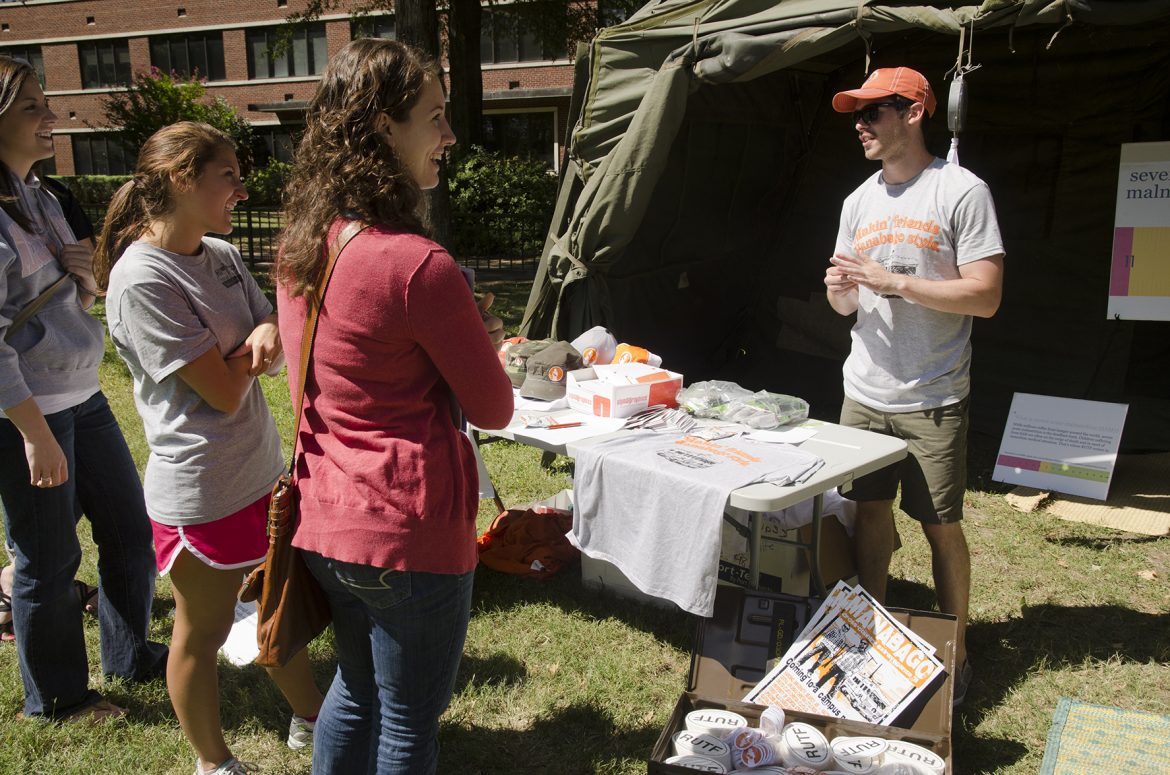Mark Slagle, a Harding graduate and Pepperdine alumnus Alex Cox visited Harding’s campus last Wednesday, Sept. 7, in a 1971 spray-painted orange and white Winnebago, turned “MANAbago,” which they parked outside of Midnight Oil and on the front lawn. It was their first stop in their three-month cross-country crusade to raise awareness about child malnutrition.
Slagle and Cox pitched a relief simulation tent outside of the Winnebago, where students watched videos about nutrition. MANA is a nonprofit organization that manufactures a peanut butter-based product loaded with protein and micronutrients for malnourished children in Africa.
“We are going around the country to speak to different audiences, whether that’s a chapel of 3,000 people at a Christian university or a frat house at Texas A&M or a church in Southern California,” Slagle said.
Cox and Slagle began driving Sept. 4 and will stop the tour on Dec. 15, or when they raise $600,000, which would be enough money to provide 10,000 children with MANA.
“I really think that our generation is really seeking something more than a great retirement plan,” Slagle said. “We’re seeking more than the American Dream, and I think that if all of the college kids at Harding could be paid in purpose, they would try to make as much purpose as they could. And so honestly, I felt this call to find a purpose.”
Fully renovated, the refurbished van has an orange and beige shag carpet, with orange and green décor and an 8 track player, playing ’70s-era musical icon Melanie Safka.
The van is fully functional, meaning that it has an oven and stove, which run off of propane, a mini-fridge and a bathroom. Two beds, one in the back and one that folds out from above the driver’s seat, make the sleeping accommodations. The pair plans to eat, sleep and live in the MANAbago for the duration of the tour.
“As long as we have a parking lot, we are good to go,” Cox said. “The van draws attention. People react to it on the road, and it gives the tour some flair.”
Since it is an old Winnebago, the MANAbago does have a few minor kinks in its system. For one, wide turns are inevitable, and the brakes have to be occasionally pumped, Cox said.
The MANAbago gets only seven miles to the gallon; however, no donation money goes directly to fueling up the vehicle, according to Mark Moore, cofounder and CEO of MANA. Rather, donors already specifically gave money to fill the van’s gas tank.
Three years ago, Moore noticed on the side of a bag of cat food that the cat food company had a van and was driving around to save a million cats. He said he thought, “If they can save a million cats, why not save children from malnutrition using the same venue?”
Then, he saw the Winnebago on the Internet for $5,800, and he said he knew that it was an opportunity for his idea to come to fruition.
“I saw it on eBay and thought, ‘This is the coolest thing ever,’ and it was affordable; it ran in great condition,” Moore said. “So, we put cool flowery curtains in it, some new tires, and got it going.”
Cox and Slagle said what drew them to MANA’s cause to end malnutrition was the tangibility of MANA itself.
“MANA is a very visual product,” Slagle said. “You can feel it in your hands, you can knead it in your hands, you can taste it if you want, but you know that your dollar — your $5, your $50 — is going to be producing that MANA and distributing it into the hands of a mother.”
